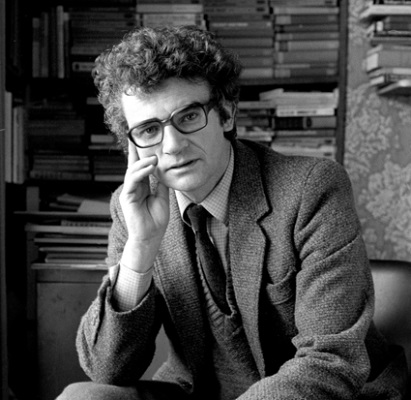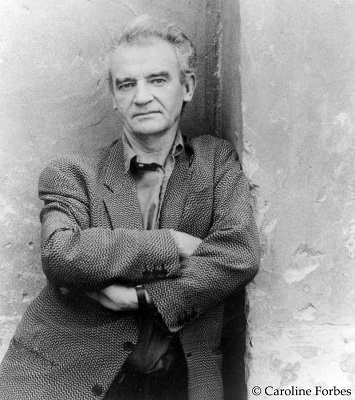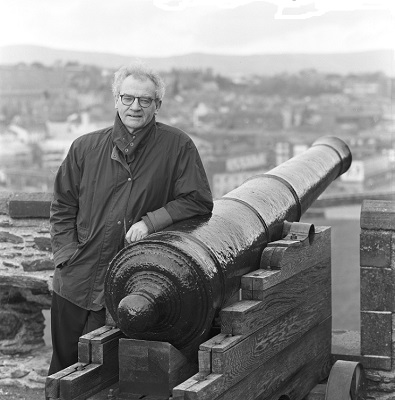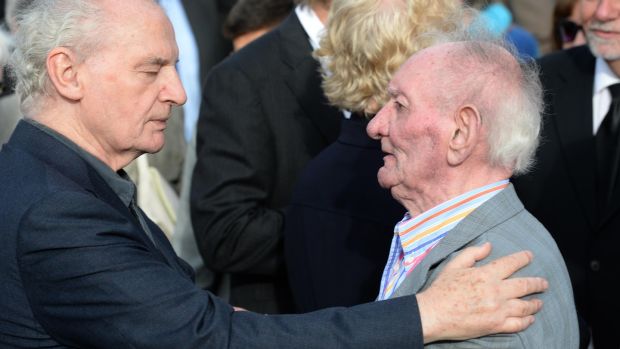Life
| 1940- [Seamus Francis Deane]; b. 9 Feb., Bogside, Derry [Londonderry], ed. St. Columb’s College, Derry, a day-boy and a classmate of Seamus Heaney - both beneficiaries of Butler Education Act (1944; extended to N.I. in 1947); proceeded to QUB (BA 1957-61), and Pembroke Coll., Cambridge (PhD 1963-68); published While Jewels Rot (1965), a poetry pamphlet; taught at Oregon, and Berkeley as Fulbright Fellow 1966-68; appt. lecturer in English and American Literature, UCD, 1969, and later Professor; m. Marion; visiting lecturer, Indiana University, Notre Dame, and Berkeley; contrib. scholarly articles La Revue de Littérature comparée; Modern Language Review, and Journal of the History of Ideas; reviews in Times Literary Supplement and New York Review of Books, and London Review of Books; Field Day director; co-ed. Atlantis (1969-73); guest. ed., The ‘ag, 1979; |
| issued Gradual Wars (1972), winner of “Æ” Memorial Prize; contested origins of violence with Conor Cruise O’Brien in columns of New York Review of Books (‘Who Began the Killing?’, 30 May 1974); issued Rumours (1977), a poetry collection; closely involved in literary and cultural discussion with Heaney, 1979-80 - of whom he once later wrote that ‘writing has itself become a form of guilt, and an expiation from it’; issued History Lessons (1983), poetry; inaugurated Field Day Pamphlet series, and issued Civilians and Barbarians (Derry 1983) as No. 3, being a critique of the stereotypes imposed by colonialism, including reflections on the conditions of Long Kesh prison (‘the most horrific imagery of degradation’); co-opt. to board of the Field Day Theatre Company [directorship]; issued Heroic Styles: The Tradition of an Idea (1984), originally a keynote lecture at the IASAIL conference of 198[4] calling for the dismantling of the ‘historical fiction [that] gave dignity and coherence to the Irish Protestant Ascendancy tradition’ and diagnosing ‘the pathology of literary unionism’ in W. B. Yeats, ending with a proposal for the post-colonial re-reading of Irish literature which served as the germ of the The Field Day Anthology of Irish Writing (Vols. 1-3, 1991) - a compilation which met with charges of unduly excluding Irish women writers [‘I forgot’, was Deane’s instant explanation in conversation with Nuala O’Faolain]; |
| issued Celtic Revivals: Essays in Modern Irish Literature (1985), A Short History of Irish Literature (1986); published his dissertation as as The French Enlightenment and Revolution in England 1989-1832 (1988), dealing with Edmund Burke, S. T. Coleridge, William Godwin, Shelley and others; issued Selected Poems (1988); contrib. on Stephen Dedalus to Cambridge Companion to James Joyce (1990); appt. Keough Prof. of Irish Studies at Notre Dame, 1993-; gave Clarendon Lecture, Oxford, May 1995; accompanied Seamus Heaney as a member of his party to the Nobel Prize award presentation in Stockholm, Jan. 1996; Reading in the Dark (1996), semi-autobiographical novel of a Derry childhood dealing with family secrecy and guilt arising from the mistaken killing of an a traitor during the 1950s IRA campaign; first excerpted as ‘Vanishings’ in Irish Review (1988), later serialised in Granta (?1991); shortlisted for Booker Prize, and compared by author to Goodbye to All That; read by Stephen Rea on BBC3; |
| contrib. an introduction to the Penguin edn. of Joyce’s Portrait of the Artist as a Young Man (1992); a keynote lecture on ‘Famine Politics’, Derry Famine Commemoration, 21 Feb. 1996; chaired symposium on “Secrets and Lies 25 Years On”, commemorating Bloody Sunday (30th Jan. 1972) and calling for a re-enquiry; Strange Country: Modernity and Nationhood in Irish Writing Since 1790 (1997), based on 1996 Clarendon Lectures at Oxford; appt. Director of Keough Institute, Notre Dame University and ND Summer School at Newman House, Stephen’s Green, Dublin, with outreach at Magee; participant in debate with Denis Donoghue and others, NY, Dec. 1997; scripted commemorative documentary on 1798, with Kevin Whelan, Luke Gibbons and others, 1998; working on The Wizard, a gothic novel; m. Marion Treacy, with four children (Conor, Ciaran, Cormac and Emer) and separated; lived in civil partnership with Emer Nolan, with whom one child (Iseult); gave IASIL keynote lecture, “Two Oxford Movements: 1850-1900”, DCU 2001; gave commissioned lecture on Thomas Moore at the RIA on the poet’s centenary, March 2002; served as gen. editor of the James Joyce series in Penguin Classics and Critical Conditons jointly published by Notre Dame and Cork UP; issues Foreign Affections: Essays on Edmund Burke (2005), largely dealing with Burke’s ideas on liberty and colonialism in the French and American connections; d. 12 May 2021, in Beaumont Hospital after a short illness; a selected edition of his essays was published by Cambridge University Press with a foreword by Joe Cleary in 2021. DIW ORM OCIL FDA |
 |
[ top ]
Works| Poetry collections |
|
| Fiction (novel) |
|
| Criticism (monographs) |
|
| Criticism (selected articles) |
|
| Bibliographical details |
|
| Query: ‘Territorial and Extraterritorial: Moments from Irish Writing: A Note’, in Nineteenth-century Contexts, 18 (q.d.) |
| Miscellaneous |
|
| Contributions to Honest Ulsterman |
|
|
||||
|
[ top ]
 |
 |
|
| For Irish studies bibliographies given in The Field Day Anthology of Irish Writing (1991), see under Bibliographies, infra. |
[ top ]
Bibliographical details
Celtic Revivals: Essays in Modern Irish Literature, 1880-1980 (London: Faber & Faber 1985), 199pp. Introduction’ [11]; ‘Arnold, Burke and the Celts’ [17]; ‘The Literary Myths of the Revival’ [28]; ‘Yeats and the Idea of Revolution’ [38]; ‘Synge and Heroism’ [51]; ‘Pearse; Writing and Chivalry’ [63]; ‘Joyce and Stephen: The Provincial Intellectual’ [75]; ‘Joyce and Nationalism’ [92]; ‘O’Casey and Yeats: Exemplary Dramatists’ [108]; ‘Joyce and Beckett’ [123]; ‘Thomas Kinsella: “Nursed out of the Wreckage”’ [135]; ‘John Montague: The Kingdom of the Dead’ [146]; ‘Derek Mahon: Freedom from History’ [156]; ‘Brian Friel: The Double Stage’ [166]; ‘Seamus Heaney: The Timorous and the Bold’ [174]; ‘Select Bibliography, 187-92; Index, 193. [Note also Wake Forest UP edn. 1987, pp.199, Bibl., 187-92pp.]‘Heroic Styles: The Tradition of an Idea’, rep. in Ireland’s Field Day (Derry: Field Day Theatre Co.; London: Hutchinson 1985), pp.45-59; also in Claire Connelly, ed., Theorising Ireland (London: Palgrave/Macmillan 2003), pp.12-26.
Reading in the Dark (London: Jonathan Cape 1996), 232pp.; Chapter One: Stairs (Feb. 1945); Disappearances (Sept. 1945); Eddie (Nov. 1947); Accident (June 1948); Feet (Sept. 1948); Reading in the Dark (Oct. 1948); Grandfather (Dec. 1948); Pistol (Jan 1949) [29]. Chapter Two: Fire (June 1949); American Cities (Sept. 1949); Blood (Oct. 1949); The Feud (Feb. 1950); The Fort (Jue 1950); Field of the Disappeared (Aug. 1950); Grianan (Sept. 1950); Katie’s Story (Oct. 1950) [71]. Part II, Chapter Three: Rats (Nov. 1950); Crazy Joe (Aug. 1951); Maths (Nov. 1951); Sergeant Burke (May 1951); Informer (June 1951); Roses (July 1951); Bishop (Aug. 1951); Grandfather (Oct. 1952); Deathbed (Nov. 1952); Lundy Burns (Dec. 1952); Father (Feb. 1953) [136]. Chapter Four: Mother (May 1953); The Facts of Life (Sept. 1953); Going to the Pictures (Nov. 1953); Haunted (Dec. 1953); Retreat (March 1954); Brothel (April 1954); Katie (May 1954) [174]. Part III, Chapter Five: Religious Knowledge (Sept. 1954); All of It? (Nov. 1954); Crazy Joe (Jan. 1955); In Irish (Oct. 1955); Political Education (Nov. 1956); Sergeant Burke (Dec. 1957) [206]. Chapter Six: People in Small Places (June 1958); Crazy Joe and Mother (Oct. 1958); Mother (Nov. 1958); Dance (Dec. 1958); Birthday Gift (may 1959); My Father (June 1961); After (July 1971) [233; End]. See also prior extract printed as ‘Vanishings: extract from a forthcoming novel’, in Irish Review, No. 3 (Cork 1988).
Strange Country: Modernity and Nationhood in Ireland Since 1790 (Oxford: Clarendon Press 1997), 269pp. CONTENTS: 1. Phantasmal France, Unreal Ireland: Sobering Reflections [1]; 2. National Character and the Character of Nations [49]; 2. Control of Types, Types of Control: The Gothic, the Occult, the Crowd [100]. 4. Boredom and Apocalypse: A National Paradigm [145]. Notes [198]; Bibliography [25]; Index [259].
Note: each chapter contains several subdivisions, e.g., Chap. 1: Foundational texts (p.1); Reading the Reflections (p.3); Aesthetic Energy, National Character (p.18), ... &c. Chap. 3: The Nation and the Famine (p.49); Speaking the Nation: The Collegians (p.56); Accents and sobriety (p.63); The Politics of Music: Thomas Moore (p.66), ... &c. See extracts in Commentary under Gerald Griffin [q.v.], Flann O’Brien [q.v.], and Bram Stoker [q.v.], et al. [See longer extracts under Quotations - infra.]
Small World: Ireland 1798-2018, with a foreward by Joe Cleary (Cambridge UP 2021), 344pp. CONTENTS: Dedication, [v-v]; Foreword, [ix-xxvii]; Acknowledgements, [xxx]; 1. Swift as Classic, [1-18]; 2. Burke in the USA [19-33]; 3. Tone: The Great Nation and the Evil Empire, [34-73]; 4. Imperialism and Nationalism, [74-93]; 5. Irish National Character 1790-1900, [94-121; 6. Civilians and Barbarians, [122-32; 7. Heroic Styles: The Tradition of an Idea [133-48]; 8. Ulysses: The Exhaustion of Literature and the Literature of Exhaustion [149-61]; 9. Dead Ends: Joyce’s Finest Moments [162-79]; 10. Elizabeth Bowen: Sentenced to Death [180-206 [The House in Paris]]; 11. Elizabeth Bowen - Two Stories in One [207-14]; 12. Mary Lavin: Celibates, [215-34]; 13. Emergency Aesthetics [235-54]; 14. Wherever Green is Read [255-69]; 15. The Famous Seamus [270-86]; 16. The End of the World [287-330]. Index, [331-44].
Query, Fiction as History: History as Fiction (Rome: Bulzoni 1984) [quoted in Neil Cornwell, The Literary Fantastic from Gothic to Postmodernism (Harvester Wheatsheaf 1990), p.138].
[ top ]
 |
| Seamus Deane with Brian Friel |
| Interviews | |
|
|
| [ top ] | |
|
|
| [ top ] | |
| Studies | |
|
|
|
|
| [ top ] | |
| Reviews | |
|
|
| Dissertations | |
|
[ top ]
Commentary
See separate file [infra].
[ top ]
Quotations
See separate file [infra].
[ top ]
John Montague, ed., Faber Book of Irish Verse (1974), selects “Return”.
Peter Fallon & Seán Golden, eds., Soft Day: A Miscellany Of Contemporary Irish Writing (Dublin: Wolfhound Press; US: Notre Dame UP 1980), selects ‘Migration’; ‘Fording River’; ‘The Brethren’.
Andrew Carpenter & Peter Fallon, eds., The Writers: A Sense of Place (Dublin: O’Brien Press 1980), contains excerpt from a long poem, with photo-port., pp.28-30.
Seamus Deane, gen. ed., The Field Day Anthology of Irish Writing (Derry: Field Day 1991), Vol. 3 [edited by himself], selects criticism and poems, intro. to Brian Friel, Philadelphia, Here I Come; and ‘Christmas at Beaconsfield’; BIOG p.1434.
Books in Print (1994): Gradual Wars (IUP 1972) [AE Memorial Prize] 0 71652 152 0]; Rumours (Dublin: Dolmen 1977) [0 85105 320 3]; History Lessons (Dublin: Gallery Press 1983) [0 90401 137 2]; Selected Poems (Oldcastle: Gallery 1988), 78pp. [1 85235 029 6; pb. 028 8]; also Deane, ed. and intro., Thomas Holcroft, The Adventures of Hugh Trevor (London: OUP 1973), xviii+511pp.; intro. Brian Friel, Selected Stories (Dublin: Gallery Press 1979), 121pp. Celtic Revivals, Essays in Modern Irish Literature (London: Faber 1984) [0 571 13506 5]; A Short History of Irish Literature (London: Hutchinson Educ. 1986), 240pp, [009161 360 4]; also French Revolution and Enlightenment in England 1789-1832 (Harvard UP 1988; rep. 1993), [0 674 32240 1]; Reading in the Dark (Granta Bks 1991), [0 1401 4206 1]; also Deane, ed., and intro. Sale Catalogues of Libraries of Eminent Persons, vol. 8, Politicians, of gen. ed., A. N. L. Munby (London: Mansell Information 1973) [0 7210 0367 3]
[ top ]
Notes
Reading in the Dark (1996), semi-autobiographical novel of a Derry childhood, narrated by the boy grown older and focussed on the haunting of his family by the secrecy and guilt arising from the mistaken killing of Uncle Eddie, a falsely-suspected traitor during the 1950s IRA campaign, while McElhinny, the real culprit and lover of the boy’s mother has since fled to America deserting his wife Kate and their child Maeve. The retreat of the mother into silence following a stroke is the measure of her inability to cope with the secret of her love for McIlhenny and the truth of her grandfather’s ordering the execution of her husband’s brother, which is carried out at An Grianan, an ancient Irish fortress above the city of Derry. The mother’s stroke coincides with the beginning of the Troubles in 1968. A politically-moderate policeman Burke, who permits the boy’s eye-witness knowledge of a fatal accident in which a lorry kills another Catholic boy to be substituted in popular lore by the idea that a police car crew carelessly perpetrated the killing occurs the dramatis persona and events of the novel, while Brother Regan urges the boys to trust in God’s justice in the next world rather than becoming involved in paramilitary activity.
Richtarik’s Field Day: One of the problems of Deane’s ‘Civilians and Barbarians’, then, becomes partisanship: ‘he sided with the oppressed barbarians in a way that, in the context, makes him sound like a terrorist sympathiser’; goes on to rebuke Deane ‘for leaving Deane out of the equation’; all cited in Lionel Pilkington, review of Marilynn Richtarik, Acting Between the Lines: The Field Day Theatre and Irish Cultural Politics, 1980-1984 (1994), in Linen Hall Review, 12, 2 (Winter 1995/96), p.11.
Declan Kiberd: Kiberd concurs with Deane’s view that in O’Casey’s plays ‘all the gunmen are shadows, and consequently his aggression towards politics is a form of shadow-boxing’ ([‘O’Casey and Yeats: Exemplary Dramatists’, in Celtic Revivals, London / Boston: Faber p.109]; quoted in Kiberd, Inventing Ireland, 1995, p.228); note also Kiberd’s remark: ‘Seamus Deane has added a subtler inflection to that analysis [viz., D. P. Moran’s] describing Synge as one who creamed off the Gaelic culture in the few remaining areas where his class had failed to exterminate it, but where he could now appropriate its energies on the eve of their extinction. (Kiberd, op. cit., p.174, citing Deane, ‘Synge and Heroism’, in Celtic Revivals, London 1985, pp.51-62.)
Errata: Introducing the poetry of Thomas Furlong in The Field Day Anthology of Irish Writing (1991, Vol. 1), Deane quotes the brief account of Furlong’s withdrawal from the world in the prologue to The Misanthrope where it is said to be recorded that he lived in London from about 1819, ‘excluded from all society, reviling and abusing his species and shunning their company and conversation’ - and, further: ‘he never stirred out but when he went to the office of a Newspaper, of which he was assistant editor, he admitted neither man nor woman servant into his apartments; he would listen to no physician in his illness; nor would he allow any minister of religion to come near him - and to sum up his character, he died as he had lived! Yet this man was once cheerful and open-hearted, but early disappointments had soured his temper and altered his disposition.’ Deane remarks ‘Furlong is an exemplary case of a writer entrapped within a dark and inexpressible subjectivity.’ Note however, that the misanthrope so described is not Furlong himself but the character to whom Furlong says the book is dedicated as its proper subject. [See further under Furlong, q.v.]
‘An Example of Tradition’, in The ‘ag, 3, 1 (1979), argues that the continuance of the various traditions, Ascendancy, revolutionary idealism, and Joycean practice of repudiation, involves betrayal of others due to co-presence of native and colonial strains in Irish culture. (See Robert Garrett, Modern Irish Poetry, Tradition and Continuity from Yeats to Heaney, 1986 [q.p.].)
Age of Rebukes: Note the recurrent use of the terms ‘rebuke’ and ‘legitimise’ in comments on Synge, etc., in Celtic Revivals (London 1985), e.g.: ‘[each] story of fantasy […] is, first, rebuked by fact and then, in the next instant, legitimised as belonging or contributing to a higher truth than mere fact could ever reach’ (p.57; quoted in Donald E. Morse, et al., A Small Nation’s Contribution to the World, Gerrards Cross: Colin Smythe, 1993, p.36).
Greeting Eagleton: Terry Eagleton’s Heathcliff and the Great Hunger (Verso 1995) was greeted by Deane as as one of the most important contributions to the Irish cultural debates in many years (London Review of Books, q.d.).
[ top ]
Reconciliation of Cultures: Apocalypse Now!’, in Alan D. Falconer, ed., Reconciling Memories (Dublin: Columba Press 1988) is quoted by Tom Kilroy in ‘Secularised Ireland’ (see Edna Longley, ed., Culture in Ireland, Diversity or Division, QUB / IIS 1991), pp.138-39.
‘Merciless Ireland’, in Guardian Weekly ([?]18 Jan. 1997), a review of Frank McCourt, Angela’s Ashes (1997), is arguably illustrative of his own attitude towards autobiographical fiction versus fictonal autobiography: ‘;McCourt is certainly a fine writer, but I wonder about his sense of economy. He believes too much in the reliability of memory as if that were enough in itself.’ [see infra.]
Female addendum: The Field Day Anthology of Irish Writing, Women’s Annexe (4th volume; due 2002), deals with writings by and about women; the section eds. are Máirín Ní Dhonnchadha, Margaret MacCurtain, Siobhan Kilfeather, Angela Bourke, Maria Luddy, Mary O’Dowd, Ceraldine Meany, Clair Wills, and Nuala Ní Dhomnaill.
Indifferent stuff: For Deane’s specialised sense of “indifference”, see under ‘The Poet’s Dream of an Audience’ [supra] and ‘Wherever Green is Read’ [supra], but also his remarks on James Joyce, quoted with commentary in Conor McCarthy, Modernisation, Crisis and Culture in Ireland 1969-1992 (Dublin:Four Courts Press 2000), as follows: ‘[...] Deane refuses to indulge in the full endorsement of Joyce that others have, since he is worried that the harmony produced by Joyce’s pluralism of languages and styles and his omnivorous narrative systems is the “harmony of indifference”, where “everything is a version of something else”, where sameness rules over diversity, where contradiction is finally and disquietingly written out.’ (Deane, Heroic Styles [ ... &c. ], 1984, p.16; rep. in Field Day Theatre Company, [London] 1986, p.56; McCarthy p.217.)
Atavism: the term ‘atavism’ meaning ‘tribal or collective memory’ was introduced to Irish criticism by [Seamus] Deane in an interview with Seamus Heaney (The Crane Bag, 1, 1977, p.168; see Edna Longley, ‘Poetry in the Wars’, rep. in Seamus Deane, gen. ed., The Field Day Anthology of Irish Writing, Vol. 3, pp.648-54; p.649; cited in Loredana Salis, ‘“So Greek with Consequence”: Classical Tragedy in Contemporary Irish Drama’, PhD Diss., UUC, 2005.)
Strange Country: The title of Deane’s essay collection and book of 1997 may reasonably be supposed to derive from the phrase in Flann O’Brien’s The Third Policeman (1967): ‘I was clearly in a strange country but all the doubts and perplexities which strewed my mind could not stop me from feeling happy and heart-light and full of an appetite for going about my business and finding the hiding-place of the black box.’ (Picador edn., p.37.) See also, however, the attribution of the title to a poem by Deane in Gerald Dawe"s review of Collected Poems (2017) - as supra. [BS]
[ top ]